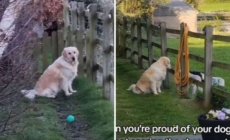-
Couple Buy Boat as ‘Tiny Home,’ Sail the World Working Remotely With 3 Pets - 18 mins ago
-
American Culture Quiz: Test yourself on groundbreaking gadgets, medical marvels and Southern staples - 20 mins ago
-
All eyes on Riley Leonard vs. Caleb Downs matchup in CFP National Championship - 24 mins ago
-
Armed Hamas militants celebrate ceasefire deal in Gaza - 50 mins ago
-
Golden Retriever Hanging Out With Lambs Was Going ‘So Well’—Until It Wasn’t - 57 mins ago
-
Jayden Daniels on Commanders vs. Lions, reflects on 2024 season | FOX NFL Sunday - about 1 hour ago
-
Misconduct alleged in report ex-UCLA professors tried to block. They got no discipline - about 1 hour ago
-
Warning Over Donald Trump’s ‘Catastrophic’ Plans To Cut School Funds - 2 hours ago
-
Trump inauguration performer Lee Greenwood defends Carrie Underwood against critics - 2 hours ago
-
Jimmy Johnson REACTS to Cowboys’ head coaching search | NFL on FOX - 2 hours ago
I Wanted to Drown. Years Later, I Discovered Why
What if I don’t come up?
I was swimming slowly, like a cruising shark, over the pale blue bottom of our neighbor’s pool.
I considered the idea as I circled underwater. In my recently abdicated life, I had been a marine biologist. One summer, I worked as a diver, collecting baby whelks from the seafloor five hours a day.
Since I had to surface when I was low on oxygen, I learned to minimize my effort and measure my breathing. This behavior became a default, and even in that warm, sunny pool, I behaved like a sea creature: deft and comfortable and not desperate for air. I could stay down here.
Finally, I did come up to breathe. I looked across to my infant daughter, C., sitting in her stroller by the shallow end.
Back underwater, I wondered: What would happen to C.?
If I were to stay under long enough, eventually, I’d float to the surface, lungs filled with water. But she would be secure in her stroller until someone came home. C. would be alright, I considered. She’s too young to even remember.
Elizabeth Joubert
Under and under I went, comforted by the idea I could calmly let the water take me.
When I had finished swimming, I took the steps slowly, feeling heavier with each increment toward land. I wrapped a sun-warmed towel around my body and kissed my daughter’s soft, round cheek. “Let’s go home,” I said.
When I told my husband what I’d thought, he was worried. But neither of us felt ready for action. For one thing, doctor’s appointments were a real headache. We’d recently moved from the U.S. to France, and as a postpartum mom, I needed to see a lot of doctors.
I was like a child in my new country, so for each visit, my French husband found the doctor, booked the appointment, took time off work to drive me, and then sat with me to translate. Seeing the gynecologist was challenging enough—seeing a psychologist was something we weren’t yet up for.
“I mean, I don’t think I’ll actually do anything,” I said. It wasn’t the first time I’d copped to suicidal ideation recently, and I hadn’t offed myself yet, so maybe he felt reassured.
The previous thought was vague: “I wish I could disappear.”
I envisioned something fantastical: a black door, like a rectangle on a geometry test, opening in front of me. I’d step through the door and be gone. The relief I felt when I pictured this was immense. I don’t want to die, I consoled myself. I just don’t want to be here anymore.
This vision came to me a few weeks after moving to France, in the dim hall of my in-laws’ Parisian apartment.
We were staying there while we waited for our furniture to ship from California. My husband had started his job immediately after our arrival while I had to juggle caring for our three-month-old baby and putting in a few hours on a contract job.
My in-laws were with us only during our first week—they’d come to Paris from their country house, ostensibly to welcome us. But we clashed mightily. Their idea about how they wanted me to behave was extremely different from how I did behave. Just before they went back to the country, things blew up in a way that caught me off guard and made me feel like I had no support in my new home.
Months in, I was still juggling work and childcare while navigating precarious cultural divides. No wonder I wanted to walk into another realm or stay underwater forever.
When I eventually came out of my depression, I pointed the blame at my in-laws for their lack of support and for the meanness they had shown me at a time when I was so vulnerable.
Not until years later, well after my second child was out of diapers, did I realize it was postpartum depression.
It showed up differently with my second daughter. When she was a few months old, I developed a deep longing for my friends and family in California. A homesickness I had never felt manifested in my chest. Even when my mom visited, I felt remorse around her, too.
At night when my mom was in the guest room, I’d start to panic. “We have to plan something fun,” I said to my husband, feeling frantic. “A trip—we haven’t done anything exciting with her.”
My mom, who hates travel and is not very interested in touring, was happiest sitting at home with me and the baby. But on my insistence, we went to Bordeaux for the weekend, and she was miserable.
For weeks, I cried because of homesickness. I wanted my cousins and my aunt and uncle and my best friends and the beach and barbecues and people who loved me and my babies.
“I feel like there’s a deep, black, hole in my heart,” I said. “That I don’t know how to fill.”
This I blamed on distance. The arrival of a second baby crystallized a homesickness that persisted in my day-to-day.
I don’t remember the end, it must have been gradual. One day I sat down to breakfast and realized my oatmeal was cold. My husband jumped, anticipating rage from me. “Why would I be mad at you because my oatmeal is cold?” He looked at me warily, like I was putting him on.
Right. I had, many times, berated him for the tiniest thing. A cup of coffee made too early and turned tepid, the scraggly Christmas tree he brought home from the hardware store, his not knowing that a latte in a Parisian café would cost six euros and taste like Nescafé.
The darkness and hopelessness I experienced had made me intolerant of small discomforts and displeasures. I had become a monster. But then, one day, I was myself again.
“That’s not who I am anymore,” I pleaded. “That’s never who I really was.”
Years later, while my daughters were at school, I was washing dishes and listening to the radio when a story came on about postpartum depression. At first, I listened casually. Then, I set down my sponge and listened carefully to a woman talk about the horrific thoughts and emotions she had experienced after her son was born.
Oh, I thought.
My dark days had begun so many months after I’d given birth, and there was so much else going on in my life, that I’d blamed the depression on outside forces. I’m sure those external forces were important, but they were not the root cause. I wish I had known, at the time, that it was internal, hormonal, temporary.
Later still, my mom told me that she had been through a short period of “being down” after I was born. She cast it as minor. I did not ask for details. It made me feel both better and worse. There is a genetic component to these things. Why didn’t she tell me?
If my daughters have babies, I will warn them. We will celebrate their growing bellies, eat cake, and run paper streamers around the house, and afterward, I will tell them of the shadow that may pass over them—that there is no shame or embarrassment, that their feelings are as strange as they think they are, and yet so real. That they should seek help, and that one day, the shadow will pass, like a cloud blown out of the sky.
Elizabeth Joubert is a Californian who was a marine biologist before trading her wetsuit for pen and paper. Her work has been published in Zibby Mag, Moms Don’t Have Time to Write, and The Haven. She lives in Paris with her husband and two daughters.
All views expressed in this article are the author’s own.
Do you have a unique experience or personal story to share? Email the My Turn team at myturn@newsweek.com
Uncommon Knowledge
Newsweek is committed to challenging conventional wisdom and finding connections in the search for common ground.
Newsweek is committed to challenging conventional wisdom and finding connections in the search for common ground.
Source link






























